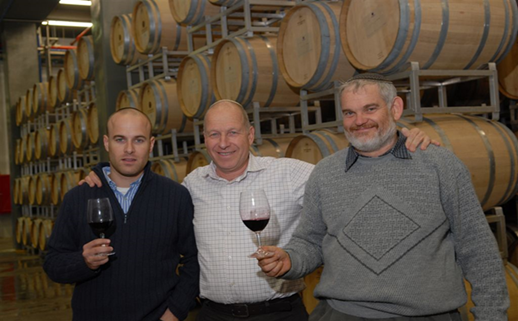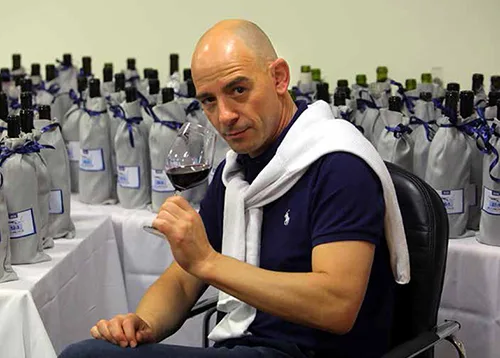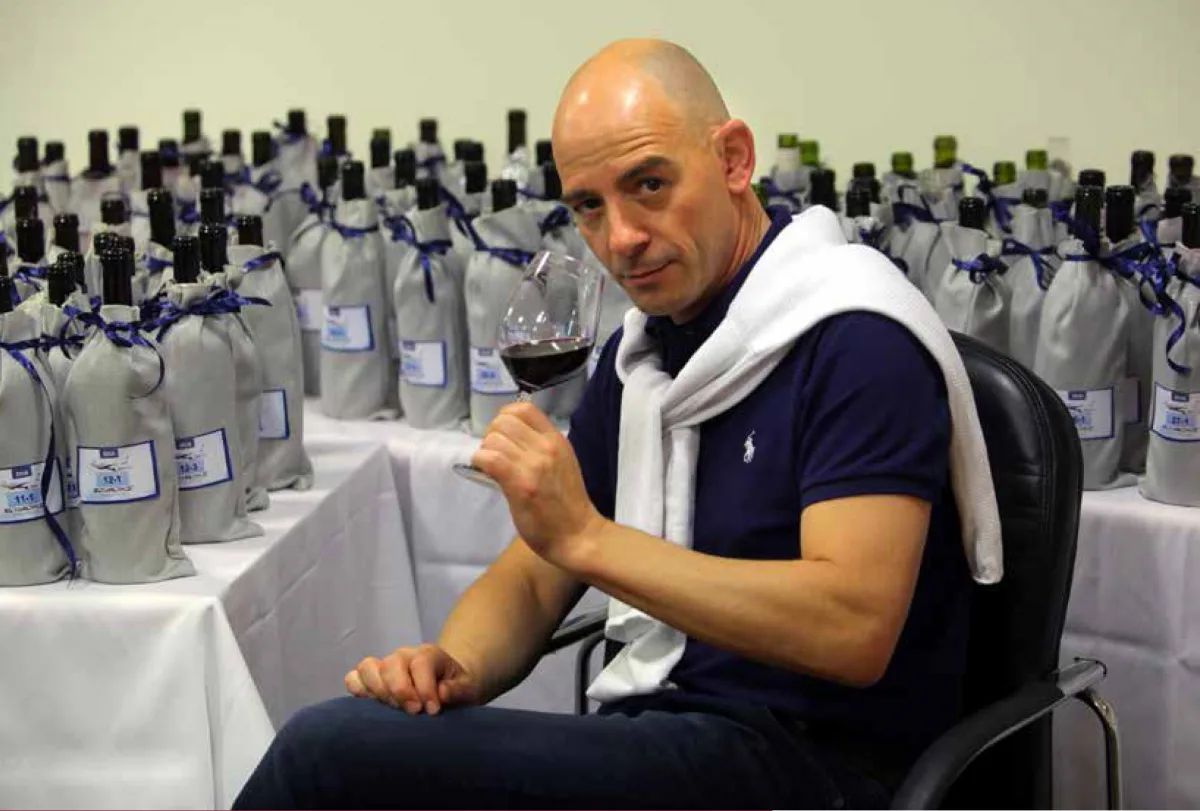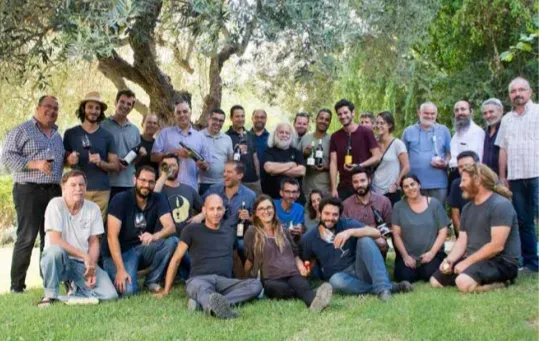Teperberg Winery is without doubt in my mind the most improved winery in the last decade. Therefore, how appropriate it is, that this year they are celebrating their 150th anniversary. That is ancient for an Israeli winery. Most Israeli wineries were founded in the last thirty years. Out of the existing wineries, only the ones owned by the Shor family are older.
Teperberg Winery is now managed by the 5th generation, Moti Teperberg, who is also Israel?s longest serving current winery CEO. He has been at the helm since 1984. It is the third largest winery in Israel, after Barkan and Carmel, and also the largest family owned winery.
The family story began in 1827 when Avraham Teperberg fled Odessa to avoid compulsory conscription to the army and turned up in Austria. There, he picked up his German sounding name and was exposed to the wine trade for the first time. In 1850 he made Aliyah to Israel and in 1852 he began trading in wines and spirits. He was particularly successful in selling to Christian Arabs, German Templars and pilgrims.
His son, Zeev Zaide Teperberg, decided to establish a winery in 1870. It was situated between Yehudim and Chabad Streets in the Old City of Jerusalem, in a place occupied by a car park today. To put this in perspective, it was not a winery like we know today. It was a small, domestic affair, producing sweet wine in casks for use as Kiddush wine for Jews or Altar & Communion wine for Christians. The grapes included Dabouki and Hebroni, grown near Bethlehem and Hebron.
The third generation was Mordechai Shimon Teperberg. The company included a winery, a distribution business and wine shops in both Jaffa and Jerusalem. At one stage they even represented the wines of Carmel Mizrahi. However, in 1921 there was a debilitating, costly court case with Carmel, over the ownership of the logo. Both wineries claimed the logo of the two spies carrying a large bunch of grapes. The compromise was in Carmel?s favor and they continue to use this logo until today. In 1925, the British Mandate ruled that all industries should leave the Old City of Jerusalem and the winery was moved to Romema in Western Jerusalem.
In 1925 there was a joint venture between Segal and Teperberg to found a distillery in the Templar community of Sarona. The Segal bothers were to be the expert distillers and Teperberg?s responsibility was distribution, sales and marketing. The project failed. Raw materials were too expensive and at around the same time, the British Mandate permitted cheaper imports. The costs of the court case, failure of the distillery and tough trading times, impinged on the success of the winery. Mordechai Shimon wanted to leave the drinks business, but was persuaded to stay on by his Rabbi. In 1929 the winery went bankrupt. This means that of the wineries with roots that go back to the middle of the 19th century (Arza, Hacormim, Zion & Teperberg), only the Shor-Zion-1848 Winery branch of the Shor family has made wine continuously! All the others had breaks in wine production.
The Teperberg family winery was revived after the founding of the state in 1951 by Menachem Teperberg, Moti?s father, along with his brother Yitzhak. Initially there was a joint venture with a member of the Shor family, but later, the Teperbergs continued on their own. The winery was situated in Mahane Yehuda, and it was named Efrat, after the route the grapes travelled to Jerusalem from Bethlehem and Hebron. Menahem wisely decided to focus on wine and left the retail part of the business to another brother. In the mid-1960s, Efrat was a tiny winery harvesting just over 100 tons of grapes. The large wineries were then Carmel Mizrahi, Eliaz and Friedman-Tnuva, followed by Carmei Zion. These would later become known as Carmel Winery, Binyamina, Barkan and Segal.
In 1964, Efrat Winery moved to Moza, just off the Tel Aviv Jerusalem highway. By 1990 they were harvesting 250 tons of grapes. They produced inexpensive wines, kiddush wines and alcohol. I had the pleasure of meeting Menahem when he was ninety years old. He talked and talked, and I scribbled frantically. It was enlightening and interesting to scratch away the cobwebs of family folklore to get to the real detail of family history.
Moti Teperberg, the 5th generation, joined the business in 1976 and became CEO, at the young age of thirty-one. He has a brother who is a judge, a sister who was a school principal and has five children. His son, Amotz, worked at the winery until recently. He recently launched a gin with an innovative look, called Yu Gin. Amotz is talented and well respected in the trade. Hopefully he will return to the winery to keep the chain of succession going.
Through the nineties the winery began to grow. They were a strong presence in the Jerusalem area, but not so well known nationwide. The marketing was always rather dubious and the wines sold because of price and hechsher, rather than quality. There was no hint of what would follow.
By the year 2000, they were producing nearly 3 million bottles of wine, spirits and grape juice. As the winery grew larger, it was clear that it had out grown Moza. It was one of the most crowded, messy and chaotic wineries I have ever seen with the floor awash with a spaghetti junction of pipes everywhere!
The astonishing thing was that Moti Teperberg, who grew up in a shtetl of liquid religion (grape juice and kiddush wine), had the vision to see there was a different way. The hyper active Moti, more a businessman than wine guy, was to prove that not only he had a vision and but also would create his legacy.
The first sign of ambition was appointing an internationally trained winemaker for the first time. Shiki Rauchberger became the winemaker of Efrat Winery in 2002. He had studied at UC Davis in America and worked with Peter Stern, who was the wine consultant of the Golan Heights Winery for twenty years and then of Carmel Winery for a further five years. He was also winemaker of Herzog Wine Cellars. Stern was arguably the key individual in the quality revolution of both Israeli (with Yarden) and Kosher wine (with Herzog.) Shiki credits him with being the main influence on his career. Shiki became winemaker of Carmel?s Rishon Le Zion Cellars from 1993, where he was very respected, until Moti Teperberg tapped him to plot the metamorphoses from Efrat to Teperberg Winery. He is a very talented winemaker, who is most happy when being amongst the vineyards. He is also a truly nice guy.
Then, in 2006, Moti Teperberg moved the winery to a new, spacious site at Tzora, near Beit Shemesh (not far from Dir Rafat Monastery, Tzora Vineyards & Mony Winery). The winemaking team was strengthened with the addition of French born, Olivier Fraty, who trained in Bordeaux and great inroads were made in connecting the vineyards to the wines via the winery. The more recent addition to the winemaking team is the American born Daniel Friedenberg. Together the winemaking trio represent an impressive team, with everyone coming from different backgrounds, with different experiences.
For the first time in 140 years, Teperberg started making wine in the vineyards. Their vineyards range from the Golan Heights to the Negev, but most are situated in the Judean Foothills and the Judean Hills. The first attempt at rebranding introduced the name ?Teperberg 1870? to the Israeli market. This was a half hearted marketing job and did not really succeed.
After numerous changes in marketing strategy and personnel, the third master stroke of Moti Teperberg was employing a smart, meticulous marketing professional, Roy Harel. With great precision, and at no little cost, they rebranded the winery using the logo of a large ?tet? on the label (the first letter of the family name in Hebrew), basing the new look on history and family. The success of this image is clear. Wine buyers have been heard entering wine stores, and asking for wines with the ?tet? on the label! The new brands ranged from the entry level Vision, Impression, Inspire, Essence up to the premier label Legacy. The wines perform at every level and due to the smart marketing, the wines also have an impressive presence on the shelves.? The Essence Rose, Inspire Famitage (a Dabouki blend) and Inspire Devotage (Malbec Marsalan) are favorites of mine. The Legacy Cabernet Franc is outstanding. The new Teperberg Winery is as far removed from the old Efrat Winery as it could be. They now produce 6 million bottles of wine a year and harvest up to 7,000 tons of grapes annually. The turnaround during the last decade has been very impressive.
However, visiting the winery, gives one the feeling they moved in yesterday. There is no problem of space, but the winery still looks as though it is half finished. Offices and a tasting room are still in container like temporary rooms. The winery is in the heart of wine tourism country, yet there is no visitors center. Every time I have met with Moti in the last 15 years, he has assured me the visitors center is next on the list. I won?t hold my breath! In my view having a visitors? center and a professional training department responsible for wine education, and succeeding in hotels & restaurants and export markets, are all connected by a thread. They require a similar expertise and an investment in creating image. Selling image not just wine, is crucial to the success of a quality winery. The Golan Heights Winery taught us that in the 1990?s. As it is, Teperberg is the only one of the ten largest wineries without a visitors? centers. Slightly absurd for the third largest winery in the country.
Teperberg Winery have launched a few wines to celebrate their 150th anniversary. The ones I liked the most were as follows:
TEPERBERG IMPRESSION FRENCH COLOMBARD 2019. A delightful white wine. Fresh, fragrant with a flowery aroma and a refreshing finish. Only 11.4% alcohol, which makes a nice change. NIS 40
TEPERBERG INSPIRE CABERNET SAUVIGNON SYRAH 2019. A great drinking wine. Very fruity, with mouth filling flavor, good structure and the soft fruit flavors continue through into the long finish. NIS 65
TEPERBERG PROVIDENCE 2016. This the prestige, icon wine launched earlier in the year. It is a blend of Cabernet Sauvignon and Petit Verdot with a little Syrah, all grown in the Upper Galilee. The wine is deep with concentrated aromas of black berry fruit. It is full bodied, complex with full fruit flavor backed with nuances from the oak aging. It has a long well-balanced finish. NIS 250
The Unfinished Symphony may have been unfinished, but it was still by Schubert! The Teperberg Winery is unfinished, but this does not detract from the amazing strides taken in the last ten years. There are wineries making good wine with appalling marketing, and vice versa. To Teperberg Winery?s credit, the wines are very good at every price point, and they had a relaunch which did justice to the quality of the wines.
Avraham Teperberg entered the wine business as a trader. Zeev Zaide Teperberg founded a winery. Mordechai Shimon Teperberg engineered to move from the Old City to Western Jerusalem, and then the business became a victim of the economic problems of the time, the business possibly suffering from having too many interests. Menahem Teperberg, Moti?s father, reestablished a winery and made the decision to focus on wine. Moti Teperberg was then the one who brought the winery into the wine world. It only remains for him to finish the job, and then can pass his impressive legacy onto the next generation.
Wine trade veteran Adam Montefiore has advanced Israeli wine for nearly 35 years. He is referred to as the ?English voice of Israeli wine.? He is the wine writer for the Jerusalem Post. www.adammontefiore.com
Photos: Shani Brill, Yeshua Yosef, Teperberg Winery





